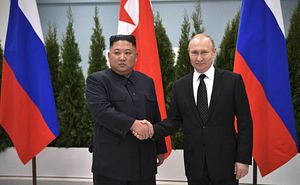In an interim report submitted to the United Nations in March, Russia said the number of North Korean workers staying in its country fell from 30,023 in 2017 to 11,490 in 2018. That could be seen as evidence that Russia is following the international sanctions against Pyongyang, despite concerns over its ties with North Korea.
Unfortunately, however, that might not be the case, according to one media report from South Korea.
Daily NK reported in July that new North Korean workers are continually flowing into Russia, and they are believed to be entering the country with a trainee or a student visa, not a proper employment visa.
Daily NK quoted a source close to the matters as saying that the North Korean workers are mainly dispatched to Khabarovsk and Ussuriysk, and they are mostly construction workers.
Although it is difficult to pin down the number of workers who recently arrived in Russia, the source said a considerable number of new personnel are being deployed at Russian construction sites, factories, or logging sites.
“The number of the workers working in Russia with official work visas may have decreased, but the chances are high that new workers are entering Russia with different types of visas such as student visa,” the paper noted.
The working conditions in Russia are known to be poor, but many North Koreans still prefer to make the trip. They can earn far more money in Russia than working back in the North.
Some of the highly skilled North Korean workers, who have been working in Russia for more than three years, are said to work on their own, on the condition that they pay $1,000 to $1,300 in “loyalty funds” to the North Korean authorities.
In other words, they are working as freelancers in Russia. Those “freelancers” could make between $2,000 and $3,000 a month, the source added.
The influx of North Korean workers is not just a boon for North Korea. Russian companies are also known to prefer North Korean workers, according to the source. They are considered not only cheap and skilled but also quick-handed among Russian employers.
The increase in North Korean workers in Russia comes amid a rising number of cargo trains bound for North Korea from Russia. Observers said this became more evident after the North Korea-Russia summit in April when leaders from the two countries met.
The Diplomat has reported several times about the dire economic situation in North Korea caused by international sanctions. It is natural for Pyongyang to try everything it can to continue to make foreign money.
But why Russia? One recent development gives a hint. According to Lim Su-ho, a researcher at South Korea’s Institution for National Security Strategy, foreign currencies such as U.S. dollars and Chinese yuan, which are coming from outside the country, are decreasing due to sanctions. As a result, more people are spending domestic currency instead.
Lim added that the value of the North Korean won had fallen significantly since the North’s currency reform in 2009, but due to a lack of foreign currencies, it has recovered to the point where the North Korean won can be used in the market.
The interesting thing to note here is that North Korea is suffering from a shortage of yuan. There have been many reports and studies indicating that the North is seeking more dollars, but the Chinese yuan has maintained a relatively stable status in the country in terms of supply and demand, thanks to exchanges and economic activities in the border area.
In this regard, it is alarming for North Korea that it’s experiencing a shortage of yuan. After all, China was the largest trade partner for the North last year.
Although Russia still plays a much smaller role in North Korea’s economy, it was still the second-largest trade partner last year. The latest signs indicate that Pyongyang is evidently determined to maximize such a relationship. Amid international sanctions, with China gradually beefing up its efforts by joining hands with the international community, growing ties between North Korea and Russia over the past few years are sparking renewed concerns.

































